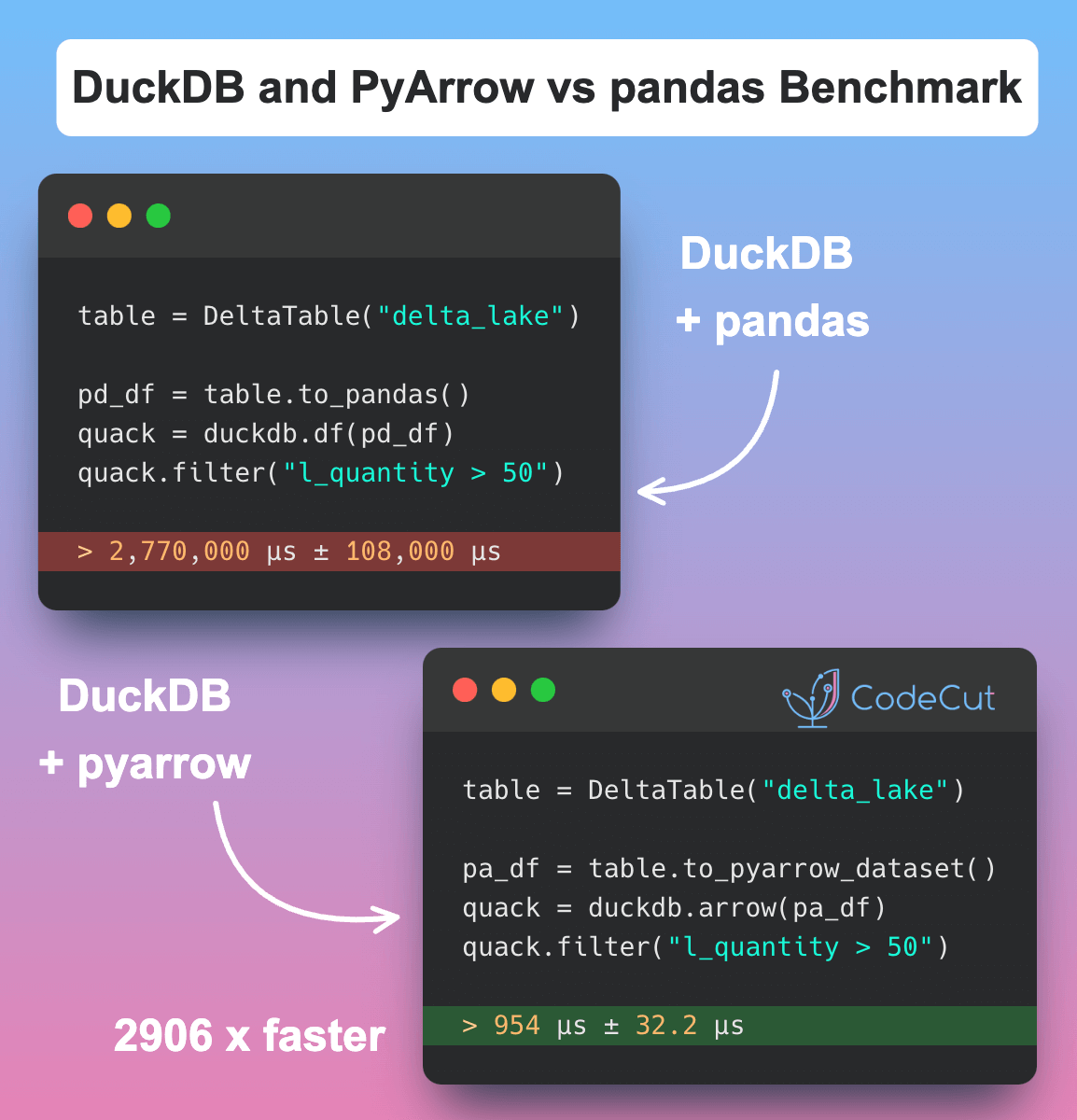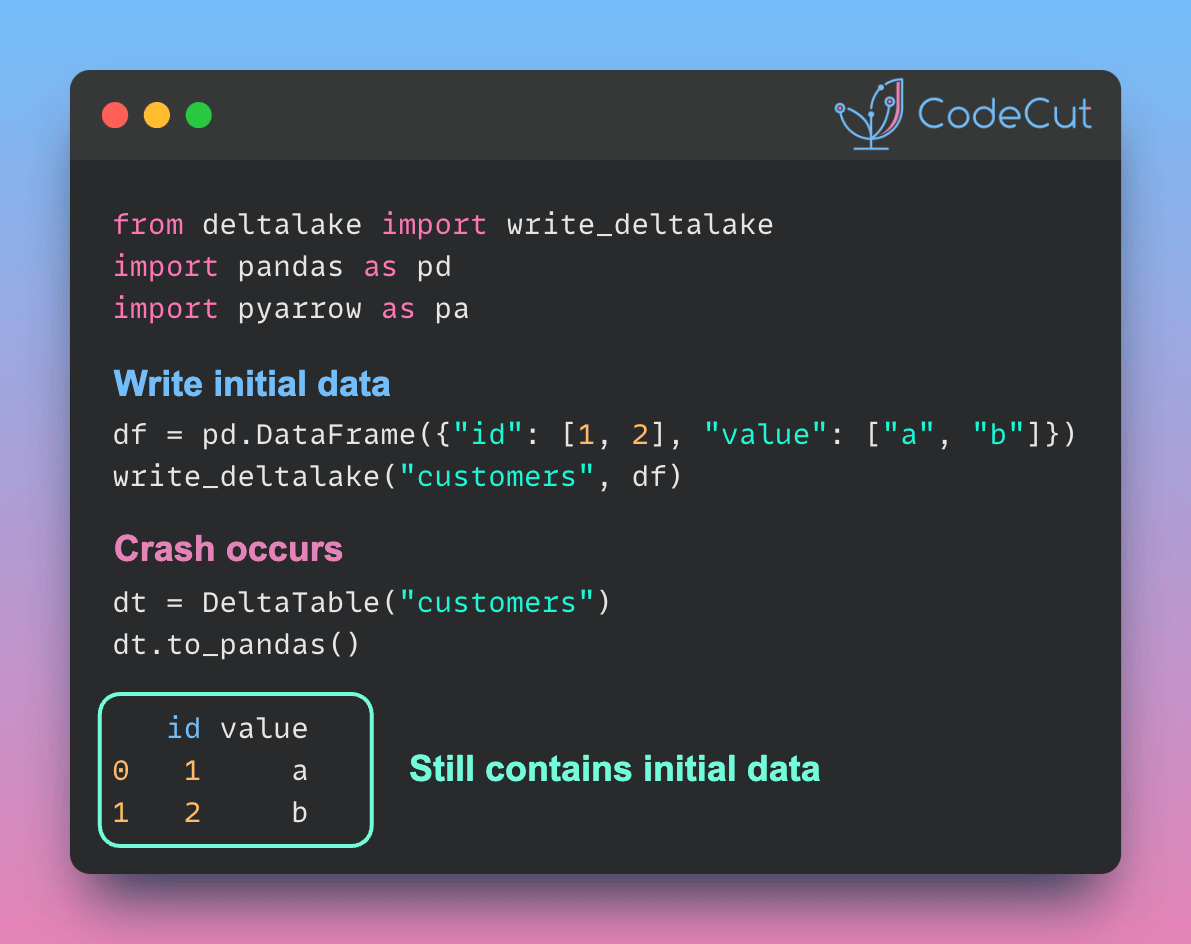Motivation
Traditional data deletion approaches are problematic for data engineers and analysts because they require loading entire datasets into memory and risk data corruption during modification.
To demonstrate these issues, let’s first create a sample dataset that resembles a real-world customer database with information about account types, balances, and activity metrics:
import pandas as pd
import numpy as np
# Create a large example dataset (1 million rows)
df = pd.DataFrame({
'customer_id': range(1_000_000),
'status': ['active', 'inactive'] * (1_000_000 // 2),
'balance': np.random.uniform(0, 10000, 1_000_000),
})
df.to_parquet('customer_data.parquet')Now let’s examine the typical approach used to delete records from this dataset. Imagine we need to remove all basic accounts with low balances and minimal activity – a common data maintenance task:
# Traditional problematic approach
try:
# 1. Load entire file (1M rows) into memory
data = pd.read_parquet('customer_data.parquet') # Memory intensive
# 2. Filter out inactive basic accounts with low balance
data = data[~((data['status'] == 'inactive') &
(data['balance'] < 100))]
# 3. Overwrite file - risk of corruption if process fails
data.to_parquet('customer_data.parquet') # Unsafe
except MemoryError:
print("Not enough memory to process 1M rows")This approach has several critical issues:
- Memory Usage: The entire dataset must be loaded into memory, which can cause OOM (Out of Memory) errors with large datasets
- Data Corruption: If the process fails during the write operation, the data file could be left in a corrupted state
- No Audit Trail: No record of what data was deleted or when
- No Recovery: Once data is overwritten, there’s no way to recover the previous state
Introduction to delta-rs
delta-rs is a native Rust library for Delta Lake with Python bindings that provides robust data manipulation capabilities. Install it using:
pip install deltalakeAs covered in the article about efficient data appending, delta-rs provides efficient data modification capabilities without loading entire datasets into memory.
Predicate-based Deletion
Building on delta-rs’s partitioning capabilities and change tracking, the delete operation allows efficient removal of specific records.
First, let’s recreate our test dataset in the Delta Lake format:
from deltalake import write_deltalake, DeltaTable
import pandas as pd
import numpy as np
# Create a large example dataset (1 million rows)
df = pd.DataFrame({
'customer_id': range(1_000_000),
'status': ['active', 'inactive'] * (1_000_000 // 2),
'balance': np.random.uniform(0, 10000, 1_000_000),
})
# Write to Delta format
write_deltalake("./customer_data", df)Now, instead of using the problematic traditional approach, we can leverage delta-rs to handle the deletion in a much safer and more efficient way:
# Perform safe deletion
dt = DeltaTable("./customer_data")
dt.delete("""
status = 'inactive' AND
balance < 100.0
""")When running this operation, delta-rs provides detailed metrics about the deletion process:
{'num_added_files': 1,
'num_removed_files': 1,
'num_deleted_rows': 5019,
'num_copied_rows': 994981,
'execution_time_ms': 220121,
'scan_time_ms': 69760,
'rewrite_time_ms': 148}This approach provides several safety guarantees:
- Time Travel: Previous versions can be accessed if needed
- Memory Efficient: Only metadata and necessary data blocks are loaded
- Transactional: Changes are atomic – either complete successfully or not at all
- Audit Trail: All operations are logged in the transaction log
You can verify the operation and access previous versions:
# Check operation history
print("Operation History:")
for entry in dt.history():
print(f"Version {entry['version']}: {entry['operation']}")
# Access previous version if needed
dt_previous = DeltaTable("./customer_data", version=dt.version() - 1)
print("\nPrevious version data:")
print(dt_previous.to_pandas().head(10))Output:
Operation History:
Version 1: DELETE
Version 0: CREATE TABLE
Previous version data:
customer_id status balance
0 0 active 2281.154365
1 1 inactive 8330.057614
2 2 active 9908.828674
3 3 inactive 3766.795979
4 4 active 8536.698571
5 5 inactive 8681.325433
6 6 active 1610.351636
7 7 inactive 2537.934431
8 8 active 4278.094055
9 9 inactive 3531.708249Conclusion
The predicate-based deletion feature in delta-rs transforms a potentially dangerous operation into a safe, transactional process. When combined with its partition overwrite capabilities, it provides a comprehensive solution for data management.





